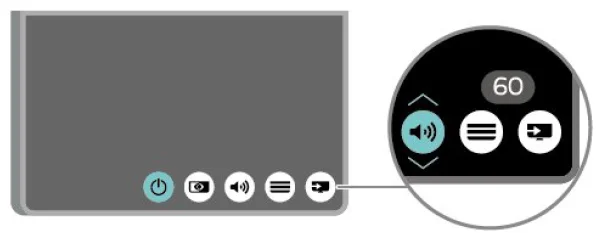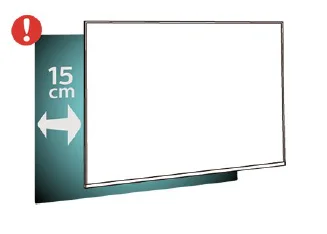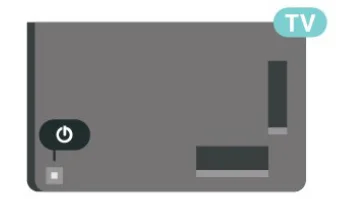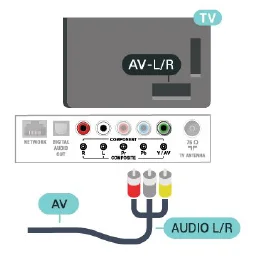
Philips OLED 8 series 4K Razor Slim OLED Smart TV
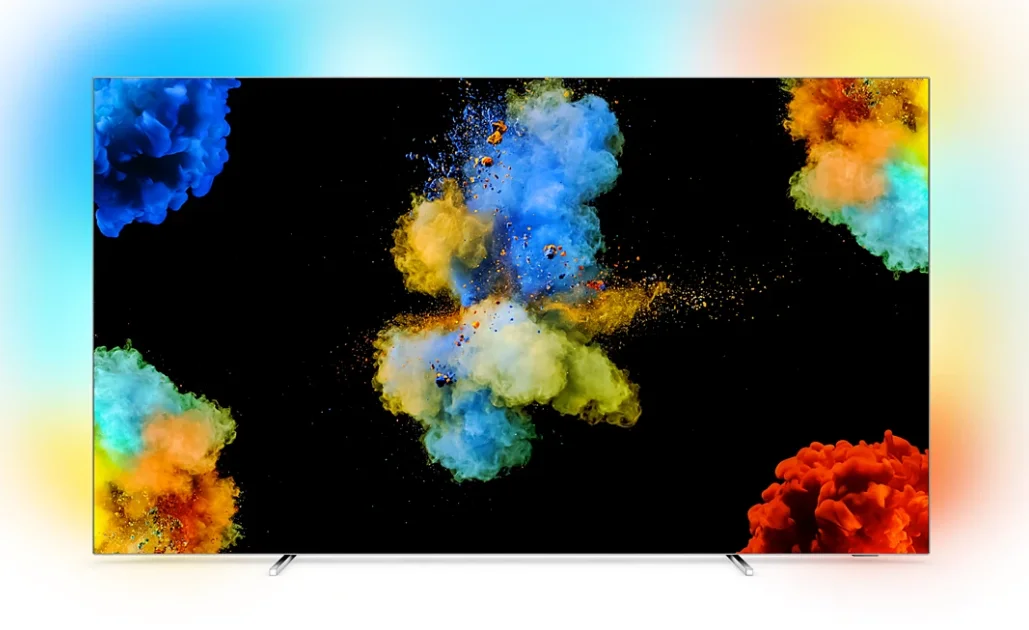
Get Support
Identify and Register your TV
Identify your TV – TV model number and serial number
You might be asked to provide the TV product model number and serial number. Find these numbers on the packaging label or on the type label on the back or bottom of the TV.
Register your TV
Register your TV and enjoy a range of benefits, including full support (including downloads), privileged access to information about new products, exclusive offers and discounts, the chance to win prizes and even participate in special surveys about new releases. Go to www.philips.com/TVsupport
Consumer Care / Repair
For support and repair, call the Consumer Care hotline in your country. Our service engineers will take care of a repair, if necessary. Find the telephone number in the printed documentation that came with the TV. Or consult our website www.philips.com/TVsupport and select your country if needed.
TV model number and serial number
You may be asked to provide the TV’s model number and serial number. Find these numbers on the packaging label or on the type label on the back or bottom of the TV.
Warning
Do not attempt to repair the TV yourself. This may cause severe injury, irreparable damage to your TV, or void your warranty.
Software
Update Software
Search for Updates
Update from the Internet
![]() Home > Settings > Update software > Search for updates > Internet (Recommended)
Home > Settings > Update software > Search for updates > Internet (Recommended)
Look for a software update yourself.
- If the TV is connected to the Internet, you may receive a message to update the TV software. You need a high-speed (broadband) Internet connection. If you receive this message, we recommend that you carry out the update.
- During the software update, there is no picture, and the TV will switch off and on again. This might happen several times. The update can take a few minutes.
- Wait until the TV picture comes back up. Do not press the power switch on the TV or on the remote control during the software update.
Look for OAD updates (Over-the-air Download)
![]() (Home) > Settings > Update software > Search for updates > Look for OAD updates.
(Home) > Settings > Update software > Search for updates > Look for OAD updates.
Scan to search for an Over-the-air software update.
Quick Guide
Remote Control
Batteries and Cleaning
Replace batteries
If the TV does not react to a key press on the remote control, the batteries might be empty. To replace the batteries, open the battery compartment on the back of the remote control.
- Slide the battery door in the direction shown by the arrow.
- Replace the old batteries with 2 type AAA-R03-1.5V batteries. Make sure the + and the – ends of the batteries line up correctly.
- Reposition the battery door and slide it back until it clicks.
- Remove the batteries if you are not using the remote control for a long time.
- Safely dispose of your old batteries according to the end-of-use directions.
Cleaning
Your remote control is treated with a scratch-resistant coating. To clean the remote control, use a soft, damp cloth. Never use substances such as alcohol, chemicals, or household cleaners on the remote control.
Key Overview
Top
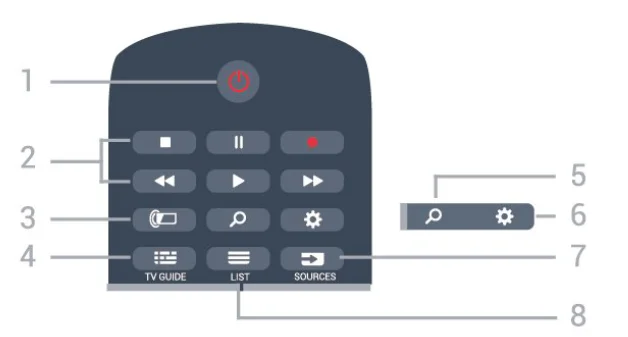
- Standby / On
To switch the TV on or back to Standby. - Playback and Record
- Play
 , to playback.
, to playback. - Pause
 , to pause playback
, to pause playback - Stop
 , to stop playback
, to stop playback - Rewind
 , to rewind
, to rewind - Fast forward
 , to go fast forward
, to go fast forward - Record
 , to start recording
, to start recording
- Play
 Ambilight
Ambilight
To select one of the Ambilight styles or switch off Ambilight. TV GUIDE
TV GUIDE
To open or close the TV Guide. Search
Search
To open the Smart TV searches page. Settings
Settings
To open the Quick settings menu. SOURCES
SOURCES
To open the Sources menu. LIST
LIST
To open or close the channel list.
Middle

 Home
Home
To open the Home menu. SMART TV
SMART TV
To open the Smart TV start page. Colour keys
Colour keys
Direct selection of options. Blue key , opens Help.
, opens Help. INFO
INFO
To open or close programme info. BACK
BACK
To close a menu without changing a setting. EXIT
EXIT
To switch back to watch TV. To stop an interactive TV application. OPTIONS
OPTIONS
To open or close the Options menu.- OK key
To confirm a selection or setting. To open the channel list while watching TV. - Arrow/navigation keys
To navigate up, down, left or right.  Picture FORMAT
Picture FORMAT
To open or close the Picture Format menu.
Bottom

 Volume
Volume
To adjust the volume level. / AD
/ AD- Short-press to mute the sound or to restore it.
- Long-press to access the Audio Description and toggle to switch on and off.
- Number keys
To select a channel directly. - SUBTITLE
To switch subtitles on, off or to show automatically.  Channel
Channel
To switch to the next or previous channel in the channel list. To open the next or previous page in Text/Teletext. To start the next or previous chapter on a disc.- TEXT
To open or close Text/Teletext.
IR sensor
The TV can receive commands from a remote control that uses IR (infrared) to send commands. If you use such a remote control, always make sure you point the remote control at the infrared sensor on the front of the TV.

Warning
Do not put any objects in front of IR sensor of the TV, it may block the IR signal.
Joystick – Local Control
Keys on TV
If you lost the remote control or its batteries are empty, you can still do some basic TV operations. To open the basic menu…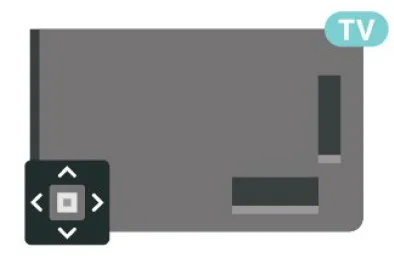
- With the TV switched on, press the joystick key on the back of the TV to bring up the basic menu.
- Press left or right to
select Volume,
Volume, Channel or
Channel or Sources.
Sources.
Select Demo to start a demo movie.
Demo to start a demo movie.
- Press up or down to adjust the volume or tune to the next or previous channel. Press up or down to go through the list of sources, including the tuner selection. The menu will disappear automatically.
Setting Up
Read Safety
Read the safety instructions first before you use the TV.
To read the instructions, in Help > User manual, press the colour key![]() Keywords and look up Safety and Care.
Keywords and look up Safety and Care.
TV Placement
Tips on Placement
- Position the TV where light does not shine directly on the screen.
- Position the TV up to 15 cm away from the wall.
- The ideal distance to watch Ultra HD TV is 2 to 5 times of its screen height. When seated, your eyes should be level with the centre of the screen.

TV Stand
You can find the instructions for mounting the TV stand in the Quick Start Guide that came with the TV. In case you lost this guide, you can download it from www.philips.com/TVsupport. Use the model number of the TV to look for the Quick Start Guide to download.
Wall Mounting
Your TV is also prepared for a VESA-compliant wall mount bracket (sold separately). Use the following VESA code when purchasing the wall mount . . .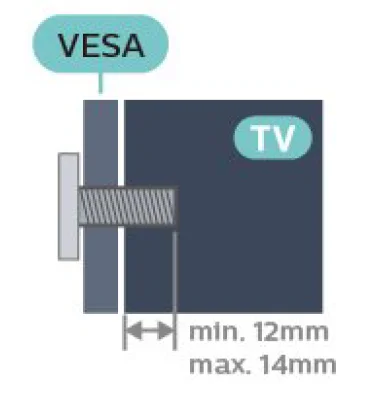
- 55OLED873
VESA MIS-F 300×300, M6 (Minimum 12 mm, Maximum 16 mm) - 65OLED873
VESA MIS-F 300×300, M6 (Minimum 10 mm, Maximum 14 mm)
Preparation
First remove the 4 plastic screw caps from the threaded bushes on the back of the TV. Make sure that the metal screws are used to mount the TV to the VESA-compliant bracket, go about 10mm deep inside the threaded bushes of the TV.
Caution
Mounting the TV requires special skills and should only be performed by qualified personnel. The TV wall mounting should meet safety standards according to the TV’s weight. Also, read the safety precautions before positioning the TV. TP Vision Europe B.V. bears no responsibility for improper mounting or any mounting that results in accident or injury.
Turn on TV
Connect Power Cable
- Insert the power cable into the POWER connector on the back of the TV.
- Make sure the power cable is securely inserted in the connector.
- Make sure that the power plug in the wall socket is accessible at all times.
- When you unplug the power cable, always pull the plug; never pull the cable.

Although this TV has a very low standby power consumption, unplug the power cable to save energy if you do not use the TV for a long period of time.
On or Standby
Before you switch on the TV, make sure you have plugged in the mains power in the POWER connector on the back of the TV.
Switch On
- Press the small joystick key on the back of the TV.

Switch to standby
To switch the TV to standby, press![]() on the remote control. You can also press the small joystick key on the back of the TV. In standby mode, the TV is still connected to the mains power but consumes very little energy. To switch off the TV completely, disconnect the power plug. When disconnecting the power plug, always pull the power plug, never the cord. Ensure that you have full access to the power plug, power cord and outlet socket at all times.
on the remote control. You can also press the small joystick key on the back of the TV. In standby mode, the TV is still connected to the mains power but consumes very little energy. To switch off the TV completely, disconnect the power plug. When disconnecting the power plug, always pull the power plug, never the cord. Ensure that you have full access to the power plug, power cord and outlet socket at all times.
Connections
Connectivity guide
Always connect a device to the TV with the highest quality connection available. Also, use good-quality cables to ensure a good transfer of the picture and sound. When you connect a device, the TV recognises its type and gives each device a correct type name. You can change the type name if you wish. If a correct type name for a device is set, the TV automatically switches to the ideal TV settings when you switch to this device in the Sources menu.
Antenna
Insert the antenna plug firmly into the Antenna socket at the back of the TV. You can connect your own antenna or an antenna signal from an antenna distribution system. Use an IEC Coax 75 Ohm RF antenna connector. Use this antenna connection for DVB-T and DVB-C input signals.
Video Device
HDMI
An HDMI connection has the best picture and sound quality. For the best signal quality transfer, use a high-speed HDMI cable and do not use an HDMI cable longer than 5 m, and also connect devices supporting HDR on HDMI 2/HDMI 3.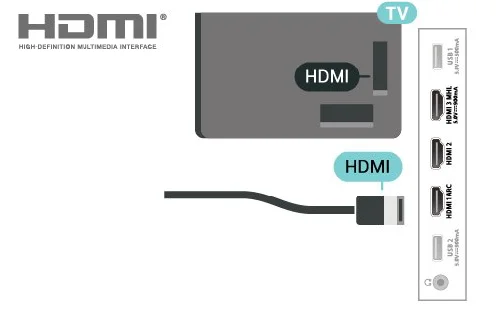
Copy protection
HDMI ports support HDCP (High-bandwidth Digital Content Protection). HDCP is a copy protection signal that prevents copying content from a DVD disc or Blu-ray Disc. Also referred to as DRM (Digital Rights Management).
Component
Y Pb Pr – Component Video is a high-quality connection. The YPbPr connection can be used for High Definition (HD) TV signals. Next to the Y, Pb and Pr signals add the Audio Left and Right signals for sound. Match the YPbPr (green, blue, red) connector colours with the cable plugs when you connect. Use an Audio L/R cinch cable if your device also has sound.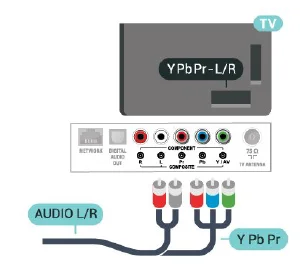
Composite
AV IN – Composite Video is a standard quality connection. Next to the signal, add the Audio Left and Right signals for sound.
- Y shares the same jack with AV.
- Component and Composite share audio jacks.

Other Device
USB Hard Drive
Installation
If you connect a USB Hard Drive, you can pause or record a TV broadcast. The TV broadcast must be digital (DVB broadcast or similar). Before you can pause or record a broadcast, you must connect and format a USB Hard Drive. Formatting removes all files from the USB Hard Drive.
To Pause
To pause a broadcast, you need a USB-compatible Hard Drive with a minimum of 4GB of disk space.
To Record
To pause and record a broadcast, you need a minimum of 250GB of disk space. If you want to record a broadcast with TV guide data from the Internet, you need to have the Internet connection installed on your TV before you install the USB Hard Drive.
- Connect the USB Hard Drive to one of the USB connections on the TV. Do not connect another USB device to the other USB ports when formatting.
- Switch on the USB Hard Drive and the TV.
- When the TV is tuned to a digital TV channel,press
 (Pause). Trying to pause will start the formatting.
(Pause). Trying to pause will start the formatting.
Follow the instructions on screen. When the USB Hard Drive is formatted, leave it connected permanently.
Warning
The USB Hard Drive is formatted exclusively for this TV; you cannot use the stored recordings on another TV or PC. Do not copy or change recording files on the USB Hard Drive with any PC application. This will corrupt your recordings. When you format another USB Hard Drive, the content on the former will be lost. A USB Hard Drive installed on your TV will need reformatting for use with a computer. To read the instructions, in Help, press the colour key ![]() Keywords and look up USB Hard Drive.
Keywords and look up USB Hard Drive.
Formatting
Before you can pause or record a broadcast, you must connect and format a USB Hard Drive. Formatting removes all files from the USB Hard Drive. If you want to record broadcasts with TV Guide data from the Internet, you must set up the Internet connection first before you install the USB Hard Drive.
Warning
The USB Hard Drive is formatted exclusively for this TV; you cannot use the stored recordings on another TV or PC. Do not copy or change recording files on the USB Hard Drive with any PC application. This will corrupt your recordings. When you format another USB Hard Drive, the content on the former will be lost. A USB Hard Drive installed on your TV will need reformatting for use with a computer.
To format a USB Hard Drive…
- Connect the USB Hard Drive to one of the USB connections on the TV. Do not connect another USB device to the other USB ports when formatting.
- Switch on the USB Hard Drive and the TV.
- When the TV is tuned to a digital TV channel, press
 (Pause). Trying to pause will start the formatting. Follow the instructions on the screen.
(Pause). Trying to pause will start the formatting. Follow the instructions on the screen. - The TV will ask if you want to use the USB Hard Drive to store apps, and agree to the question if you do.
- When the USB Hard Drive is formatted, leave it connected permanently.
Switch Source
Source List
- To open the sources menu, press
 SOURCES.
SOURCES. - To switch to a connected device, select the device with the arrows › (Right) or ‹ (Left) and press OK.
- To close the source menu without switching to a device, press
 SOURCES again
SOURCES again
Rename Device
- Only CVBS, YPbPr, and HDMI sources can be renamed or replace the device icon.
 (Home) > Settings > All settings > General settings > Input sources > Source > Edit
(Home) > Settings > All settings > General settings > Input sources > Source > Edit
- Select one of the device icons and press OK the preset name appears in the typing field.
- Press ∧ (up) to move to the typing field, press OK, then enter the new name using the on-screen keyboard.
- Press
 (red) key to enter with lower-case
(red) key to enter with lower-case - Press
 (green) key to enter with upper-case
(green) key to enter with upper-case - Press
 (yellow) key to enter number and symbol
(yellow) key to enter number and symbol - Press
 (blue) key to delete a character
(blue) key to delete a character
- Press
- Select Done when completed the editing.
Recording and Pausing TV
Recording
What You Need
You can record a digital TV broadcast and watch it later. To record a TV programme, you need…
- a connected USB Hard Drive, formatted on this TV,
- digital TV channels installed on this TV
- to receive channel information for the on-screen TV Guide
- a reliable TV clock setting. If you reset the TV clock manually, recordings may fail.
You cannot record when you are using Pause TV. In terms of the enforcement of copyright legislation, some DVB providers can apply different restrictions by means of DRM (Digital Rights Management) technology. In case of broadcasting protected channels, recording, record validity, or number of views may be restricted. Recording may be completely prohibited. In case of trying to record a protected broadcast or play back an expired recording, an error message can appear.
Record a Programme
Record Now
To record the programme you are watching right now, press![]() (Record) on the remote control. The recording will start immediately. To stop the recording, press
(Record) on the remote control. The recording will start immediately. To stop the recording, press![]() (Stop). When TV Guide data is available, the programme you are watching will be recorded from the moment you press the recording key until the programme ends.
(Stop). When TV Guide data is available, the programme you are watching will be recorded from the moment you press the recording key until the programme ends.
- If you receive TV guide information from the broadcaster, the recording starts immediately. You can adjust the end time of the recording in the list of
recordings.
Schedule a Recording
You can schedule a recording of an upcoming programme for today or a few days from today (maximum of 8 days away). The TV will use the data from the TV Guide to start and end the recording.
To record a programme…
- Press
 TV GUIDE.
TV GUIDE. - On the TV guide, select the channel and programme you wish to record. Press 〉 (Right) or 〈 (Left) to scroll through the programmes of a channel.
- With the programme highlighted, press the colour key
 Record. The programme is scheduled for recording. A warning will show automatically when overlapping recordings are scheduled. If you plan to record a programme in your absence, remember to leave the TV switched to Standby and the USB Hard Drive switched on.
Record. The programme is scheduled for recording. A warning will show automatically when overlapping recordings are scheduled. If you plan to record a programme in your absence, remember to leave the TV switched to Standby and the USB Hard Drive switched on.
Specifications
Power
Product specifications are subject to change without notice. For more specification details of this product, see www.philips.com/TVsupport
Power
- Mains power: AC 220-240V +/-10%
- Ambient temperature: 5°C to 35°C
Reception
- Aerial input: 75 ohm coaxial (IEC75)
- Tuner bands: Hyperband, S-Channel, UHF, VHF
- DVB: DVB-T2, DVB-C (cable) QAM
- Analogue video playback: SECAM, PAL
- Digital video playback: MPEG2 SD/HD (ISO/IEC 13818-2), MPEG4 SD/HD (ISO/IEC 14496-10)
- Digital audio playback (ISO/IEC 13818-3)
Display Resolution
Diagonal screen size
- 55OLED873: 139 cm / 55 inch
- 65OLED873: 164 cm / 65 inch
Display resolution
- 3840 x 2160
Supported Input Resolution -Video
Support Timing
Video support timing also includes field/frame rate 23.976Hz, 29.97Hz, and 59.94Hz.
HDMI
- 480i – 60Hz
- 480p – 60Hz
- 576i – 50Hz
- 576p – 50Hz
- 720p – 50Hz, 60Hz
- 1080i – 50Hz, 60Hz
- 1080p – 24Hz, 25Hz, 30Hz, 50Hz, 60Hz
- 3840 x 2160p – 24Hz, 25Hz, 30Hz
- 3840 x 2160p – 50Hz, 60Hz (HDMI 2, HDMI3)
Component, Composite
Composite
- PAL, NTSC, SECAM
Component
- 480i
- 480p
- 576i
- 576p
- 720p – 50Hz, 60Hz
- 1080i – 50Hz, 60Hz
- 1080p – 50Hz, 60Hz
Supported Input Resolution – Computer
- 640 x 480 – 60Hz, 72Hz, 75Hz, 85Hz
- 800 x 600 – 60Hz, 72Hz, 75Hz, 85Hz
- 1024 x 768 – 60Hz, 70Hz, 75Hz
- 1280 x 768 – 60Hz
- 1280 x 800 – 60Hz
- 1280 x 960 – 60Hz
- 1280 x 1024 – 60Hz
- 1360 x 768 – 60Hz
- 1366 x 768 – 60Hz
- 1440 x 900 – 60Hz
- 1680 x 1050 – 60Hz
- 1920 x 1080 – 60Hz
- 1920 x 1200 – 60Hz
- 3840 x 2160 – 60Hz
Sound
- Dynamic Surround
- Clear Dialogue
- Smart Sound
- 5 Band Equalizer
- Output power (RMS): 30W
- Dolby® Audio
- DTS-HD (M6)
For more manuals by Philips, visit ManualsLibraryy
Philips OLED 8 series 4K Razor Slim OLED Smart TV-FAQs
Is the Philips OLED TV a good choice?
Yes, the Philips OLED TV delivers exceptional picture quality and smooth performance. With 4K @ 120Hz, HDMI 2.1, and VRR support, it’s ideal for gaming and cinematic viewing.
Which TV is better, LG or Philips?
LG OLED TVs generally offer superior contrast and color accuracy, while Philips TVs stand out for their Ambilight technology and Android TV integration, offering immersive ambiance at a great value.
How long does a Philips Smart TV typically last?
On average, a Philips Smart TV can last between 7 to 10 years with proper care and usage. Avoid overheating and use energy-efficient settings to extend its lifespan.
How long do OLED TVs last?
With regular maintenance, OLED TVs can last well over 10 years. OLED panels use self-illuminating pixels, which maintain brightness and performance when properly cared for.
Which lasts longer, OLED or QLED?
QLED TVs usually last longer due to their backlight technology, but OLED TVs offer deeper blacks and better contrast. Both can last thousands of hours before noticeable degradation.
Is OLED better than LED for a 55-inch TV?
Yes. OLED panels outperform LEDs in contrast, black levels, viewing angles, and uniformity, providing a more cinematic and detailed viewing experience.
What is the best Philips OLED TV model?
The Philips 65OLED+950 is among the top models, featuring the META V3 OLED panel with 3700 nits peak brightness and 144Hz refresh rate for exceptional HDR and motion clarity.
Is Philips better than Hisense?
Philips offers superior picture quality with its P5 Picture Engine and OLED panels, while Hisense focuses on value and competitive performance in QLED and 4K models.
Is Philips a reliable TV brand?
Yes, Philips TVs are known for high-quality displays, solid construction, and long-term reliability, backed by their experience in electronics and innovation.
How far should I sit from a 65-inch TV?
For comfortable viewing, sit about 8 to 9 feet away from a 65-inch screen. This distance ensures immersive visuals without eye strain.


